Disability Innovation in Pakistan
GDI Hub has been driving disability inclusion and innovation globally since 2018 through our flagship AT2030 programme. With the launch of the third cycle of AT2030 and increased emphasis on storytelling and regional capacity building, GDI Hub is not only growing our expertise in new areas of research but also geographically expanding our research and practice portfolio.
GDI Hub is working alongside global and local partners in Pakistan through our work with the Asian Development Bank, our UKAid-funded AT2030 programme, and our academic research and innovation acceleration. Last week, GDI Hub’s Dr Maryam Bandukda and Pollyanna Wardrop visited Islamabad and Karachi in Pakistan to speak with partners and stakeholders with expertise in and delivery of capacity building, AT innovation, inclusive employment, economic inclusion, and the social welfare of people with disabilities.
Alongside the delivery of workshop and project-specific activities, this visit provided a unique opportunity to meet instrumental decision-makers, innovators, advocates, and researchers from across Pakistan's growing disability innovation sector – to explore collaborative learning and future opportunities.
Workshop: Storytelling for Disability Advocacy
As part of her work on AT advocacy and storytelling, Dr Maryam Bandukda also ran a workshop with a student cohort of the Blind Institute for National Awareness & Empowerment (BINAE) Education Foundation, an OPD providing quality education, vocational training, and personal development opportunities for people with visual impairments with the aim to achieve financial independence and social integration.
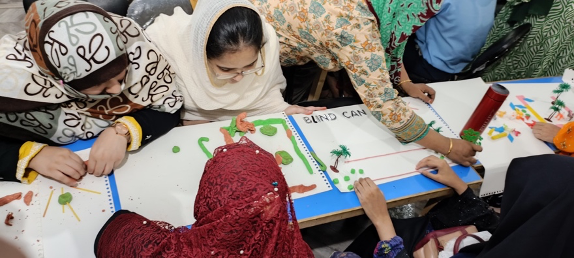
Participants designed stories showcasing resilience, perseverance, and inclusion of people with disabilities in society
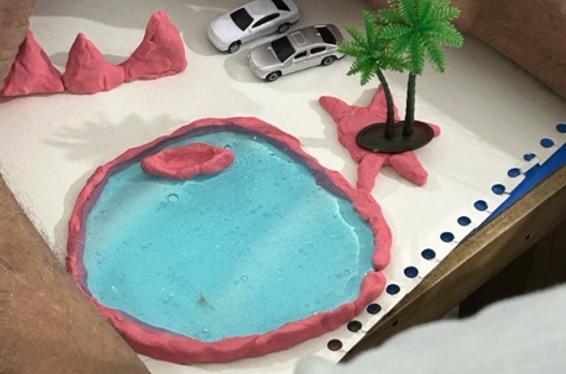
A story showcasing the inclusion of people with disabilities in leisure and tourism
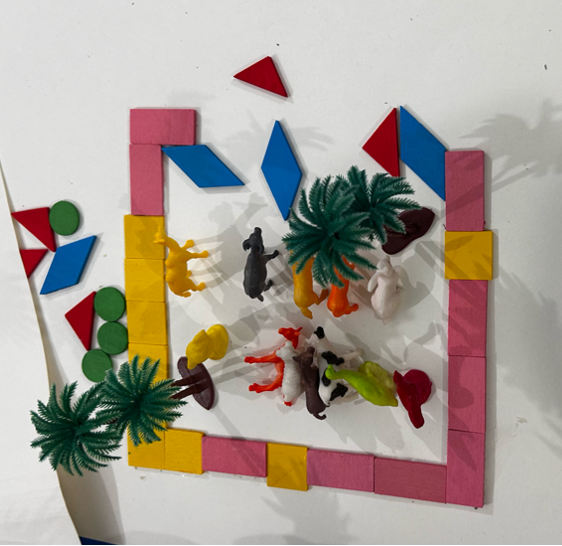
A story showcasing inclusive infrastructure
Through multisensory storytelling using arts and crafts materials, the workshop participants explored societal issues such as disability stigma, inclusive design of built-environment infrastructure, inclusive tourism and leisure, disability advocacy and representation, financial inclusion, and equitable society. The participants also shared their lived experiences across these themes and the challenges experienced due to the lack of awareness of disability, negative societal attitudes, and limited availability of accessible education and employment opportunities for people with visual impairments. Despite these challenges, the participants demonstrated incredible resilience and willingness to self-advocate for their rights, including access to AT.
Understanding the broader disability inclusion and innovation context in Pakistan
During their visit, the GDI Hub team met with Organisations of Persons with Disabilities (OPDs) and Non-government Organisations (NGOs) working towards the inclusion of people with disabilities, addressing the impact of climate change, and implementing disaster risk reduction (DRR) programmes across the country.
Pakistan is an emerging technology market that has seen rapid growth in AT startups. This burgeoning sector is attracting global attention, fostering innovation and investment opportunities.
Tameer-e-Khalaq Foundation (TKF) is a dynamic social enterprise in Pakistan that fosters innovation and sustainable development through community engagement and capacity building. The GDI Hub team met with Mr Muhammad Usman Aslam, Head of Climate Change Initiatives, DRR and Strategic Partnerships at TKF, to discuss TKF’s initiatives on climate action and building the resilience of marginalised and climate-induced disaster-affected communities.
Despite its minimal contribution to greenhouse gas emissions, Pakistan is disproportionally impacted by climate change due to its geographical location and socio-economic challenges. Particularly marginalised communities, including rural populations and the urban poor, face heightened risks from extreme weather events, water scarcity, and food insecurity. TKF implements a range of programmes that emphasise education, vocational training, and entrepreneurial support, aiming to uplift marginalised groups and enhance their socio-economic status.
The team also met with Mr. Atif Sheikh, Executive Director of the Special Talent Exchange Programme (STEP), and Ms. Abia Akram, Founder of the National Forum of Women with Disabilities in Pakistan and a globally recognised disability rights activist.
STEP is a pioneering initiative dedicated to empowering individuals with disabilities through advocacy, skill development, and inclusive opportunities. Established in 1997, STEP aims to integrate people with disabilities into the mainstream by promoting their rights and enhancing their capacities. The programme focuses on key areas, including education, employment, and accessibility, ensuring that people with disabilities have equal opportunities to contribute to and benefit from society. STEP collaborates with government bodies, non-governmental organisations, and international agencies to create awareness, influence policy changes, and implement inclusive practices across Pakistan. Through its comprehensive approach, STEP has made significant strides in breaking down barriers and fostering a more inclusive environment where individuals with disabilities can thrive and achieve their full potential. The team discussed opportunities for collaboration on capacity building, economic empowerment, and the inclusion of people with disabilities in the workforce. They also discussed GDI Hub’s AT2030 OPD and AT user engagement sub-programme for building self-advocacy and amplifying the voices of people with disabilities through storytelling and media initiatives.
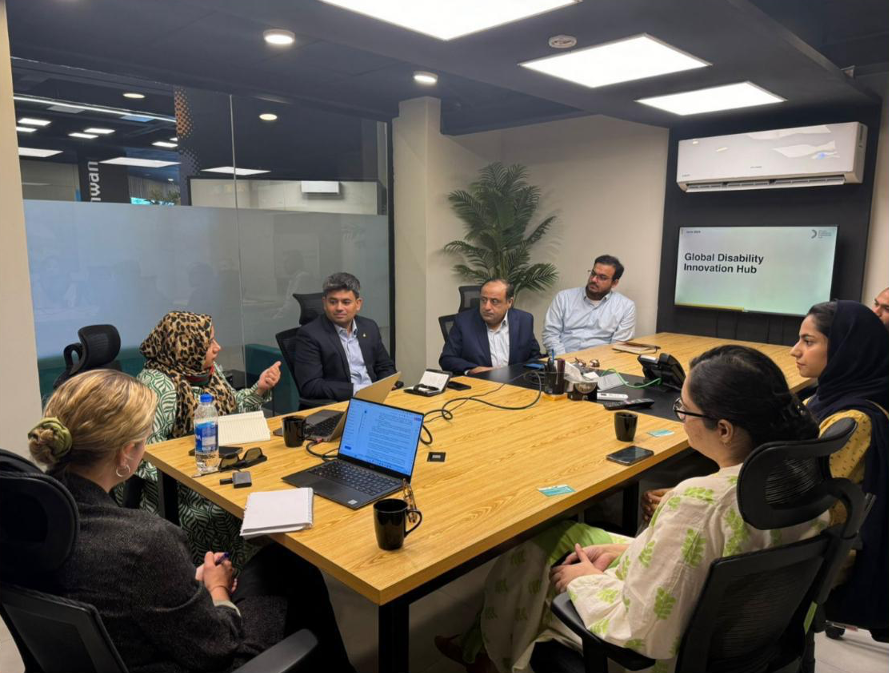
GDI Hub team meeting with TKF and STEP
The team also had the pleasure of meeting Dr. Maryam Mallick, Technical Advisor, WHO Pakistan, and Dr. Maryam Rab, Head of Research Programmes (Research and Insight), British Council, to discuss the current state of inclusive education and the potential for mobile and emerging technologies to aid people with disabilities, particularly children, in having better access to education. Dr. Maryam Bandukda shared insights from the Mobile as AT project, co-funded by ATScale, Google, and AT2030, currently being implemented in Brazil, India, and Kenya. The findings from this project, also presented at the Inclusive Africa conference in May 2024, highlight the impact of Android smartphones as assistive technology to increase access to education and employment and improve the overall quality of life for people with visual and hearing impairments in lower and middle-income countries. The team discussed opportunities for digital inclusion and AT to mainstream inclusive education in Pakistan.
Telecommunications and Internet service providers play a crucial role in closing the digital divide and creating an enabling environment for the digital inclusion of people with disabilities. Pakistan has a unique federal and provincial government structure; the 18th Amendment to the constitution (2010) gives provincial governments self-governing, legislative, and financial autonomy. Thus, regulators have a higher responsibility to mainstream gender and disability inclusion across the country and economic sectors. The team had a productive conversation with Ms Malahat Obaid, Director of Public Relations, and her team at the Pakistan Telecommunication Authority (PTA) on the role of the PTA as a regulator in establishing policies to promote the digital inclusion of people with disabilities in Pakistan. The PTA has been actively working towards gender inclusion through initiatives supporting women's economic empowerment and narrowing the digital gender divide.
Financial Inclusion and Capacity Building for People with Disabilities
Over the last year, GDI Hub has been working with the Asian Development Bank (ADB) to promote disability inclusion in the financial sector in Pakistan. This is further supported by the commitment of the financial sector regulator, the State Bank of Pakistan, by launching their policy for financial inclusion of people with disabilities, mandating banks to develop model branches to make banking services disability inclusive and ensure at least 2% of their workforce is disabled.
The NOWPDP Center of Excellence for Financial Inclusion (CEFI) spearheads initiatives to promote the inclusion of disabled people in the banking and wider financial sector workforce.
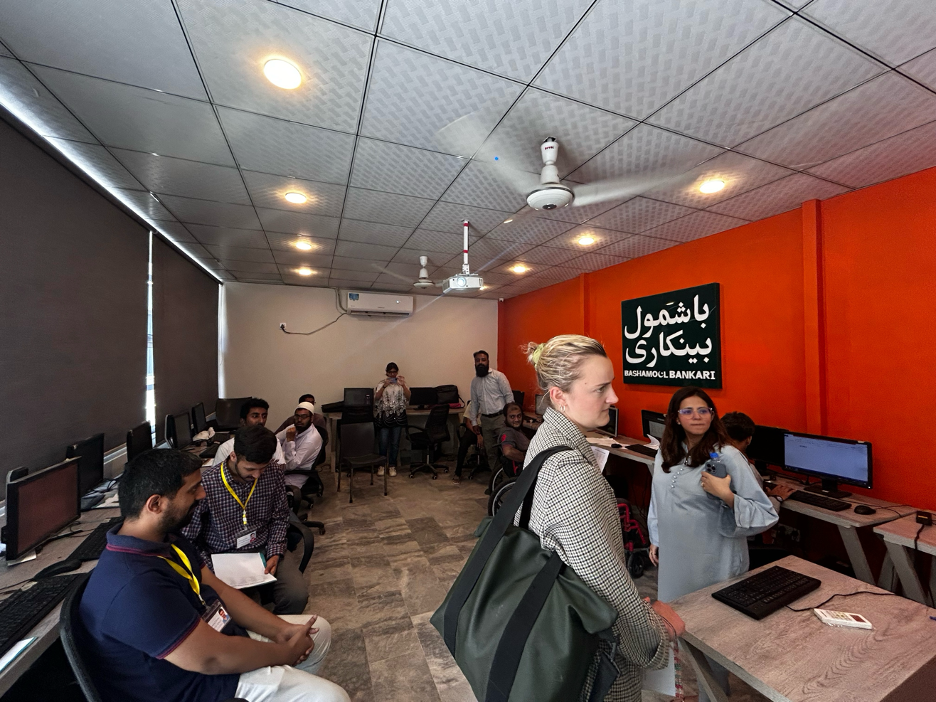
Pollyanna at the NOWPDP Center of Excellence for Financial Inclusion
During their visit to the NOWPDP CEFI, the team had the opportunity to observe the breadth of services and training offered, including early years education, financial literacy, vocational (sewing, embroidery, crafting), and innovation for economic empowerment. Thus far, CEFI has successfully orchestrated engagement with 22 banks to set benchmarks for inclusivity in financial institutions. A notable achievement of this collaboration is the creation of more than 400 job opportunities for persons with disabilities in various banking roles across major cities such as Karachi, Lahore, Islamabad, and Hyderabad, 1,800 banking staff given disability sensitisation training, 200 trained in sign language, 120 disability champions created among banking staff, and 1,500 PWDs given financial literacy.
Disability Innovation in Pakistan
Pakistan has a flourishing technology innovation ecosystem supported by the Ignite National Technology Fund program. The GDI Hub team had the opportunity to visit the National Science and Technology Park, based at the National University of Science and Technology, a world-leading centre of excellence and innovation in climate resilience and sustainability. In 2022, NSTP was ranked among the top 200 universities in the Times Higher Education Impact Rankings. In addition to their transformational leadership on climate and sustainability, NUST NSTP has also launched several initiatives supporting technology innovation and entrepreneurship pathways for NUST students and youth from marginalised communities to come together to solve societal challenges.
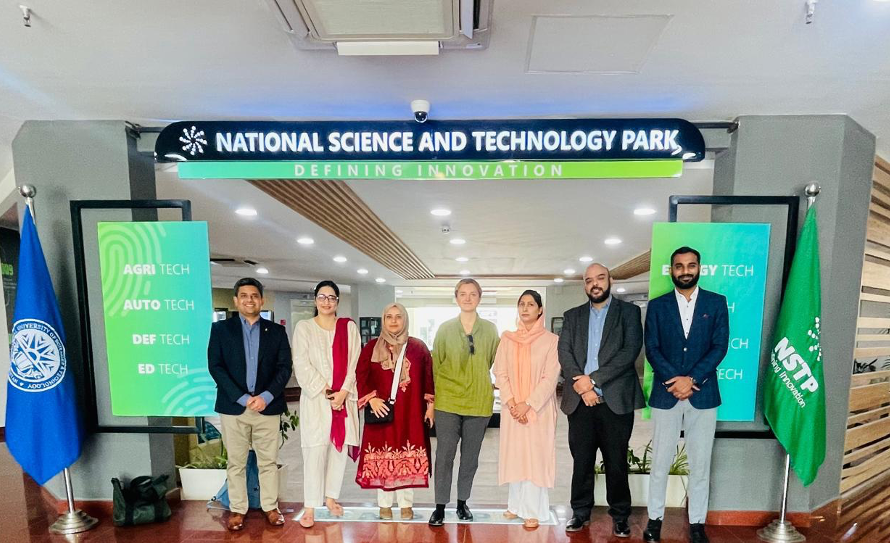
GDIHub team with NUST NSTP leadership team
The team also visited the National University of Technology (NUTECH) Office of Research Innovation and Commercialization to discuss their capacity-building initiatives for marginalised groups and people with disabilities. The meeting showcased NUTECH’s existing partnerships with global universities and harnessing the innovation ecosystem and knowledge exchange between academics, students, and innovators. NUTECH also offers technical and vocational skill development programmes for marginalised communities, including women and girls from diverse socioeconomic and demographic backgrounds, people from religious and ethnic minorities, and people with different disabilities. The team discussed opportunities for collaboration between the academic institutions to enable knowledge sharing and exchange of ideas among academics and students to promote disability inclusion in higher education in Pakistan.
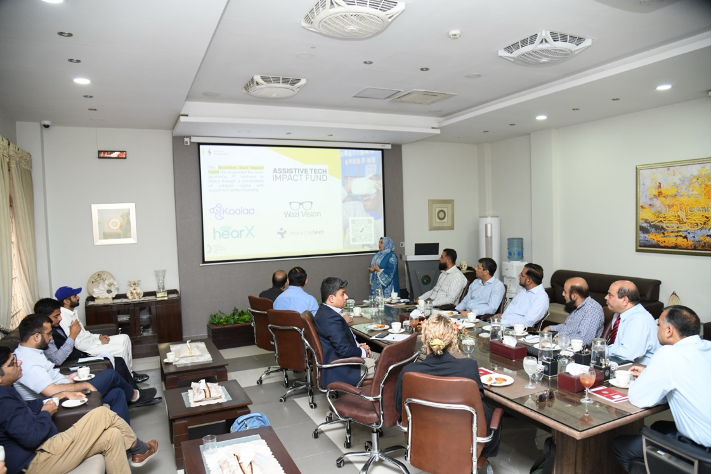
Maryam presenting GDI Hub Accelerate's AT innovation initiatives at NUTECH
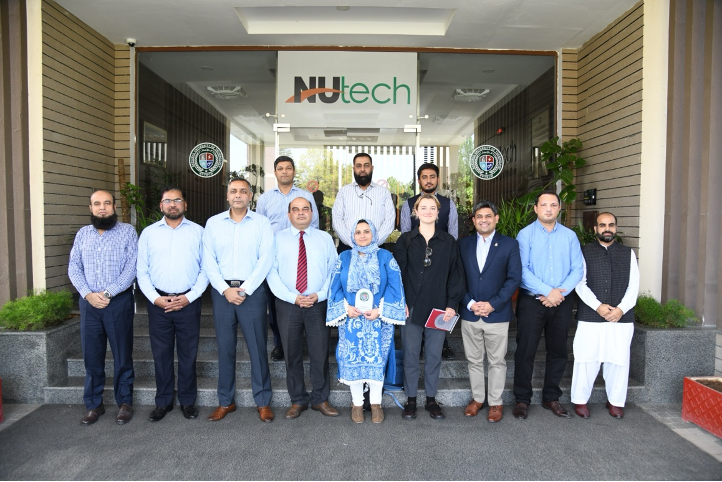
Maryam and Pollyanna with the NUTECH NORIC leadership team
As an emerging technology market, Pakistan has seen rapid growth in AT startups. The increase in entrepreneurial activities and the support from both government and private sectors have created a conducive environment for these startups to thrive.
ConnectHear is a stellar example of AT startup success. Stemming from the personal experience of co-founder Azima Dhanjee—a Child of Deaf Adult (CODA)—and her desire to mainstream the inclusion of Deaf individuals. ConnectHear Application, an instant and remote interpretation service, currently has an active base of 22,000 users as well as 10+ public and private organisations. It provides spoken and sign language interpretation in English, Urdu, Hindi, and other regional languages across the South Asian sub-continent and the South Asian diaspora globally. The GDI Hub team met with ConnectHear co-founders Azima Dhanjee and Arhum Ishtiaq at their office in Karachi to discuss their programme of work to support communities and employers through their flagship mobile application, sign language training, and disability sensitisation workshops. They also discussed the plans for further advancements to the mobile application, industry partnerships, and geographical expansion. The ConnectHear team are working towards the expansion of their services to LMICs globally and are looking for partnerships and collaborations to make this happen.
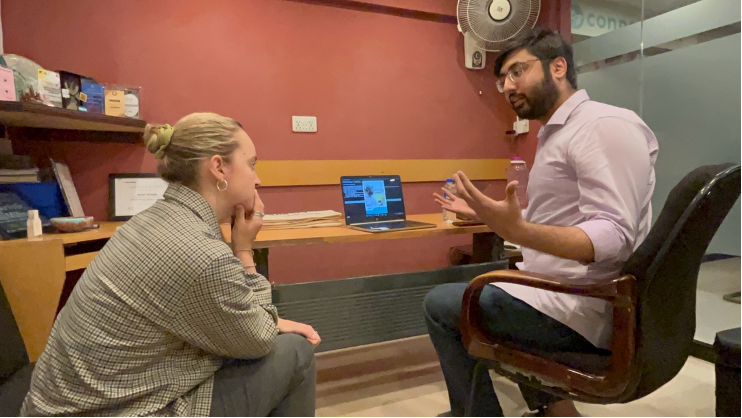
ConnectHear co-founder Arhum Ishtiaq showcases their upcoming mobile app features.
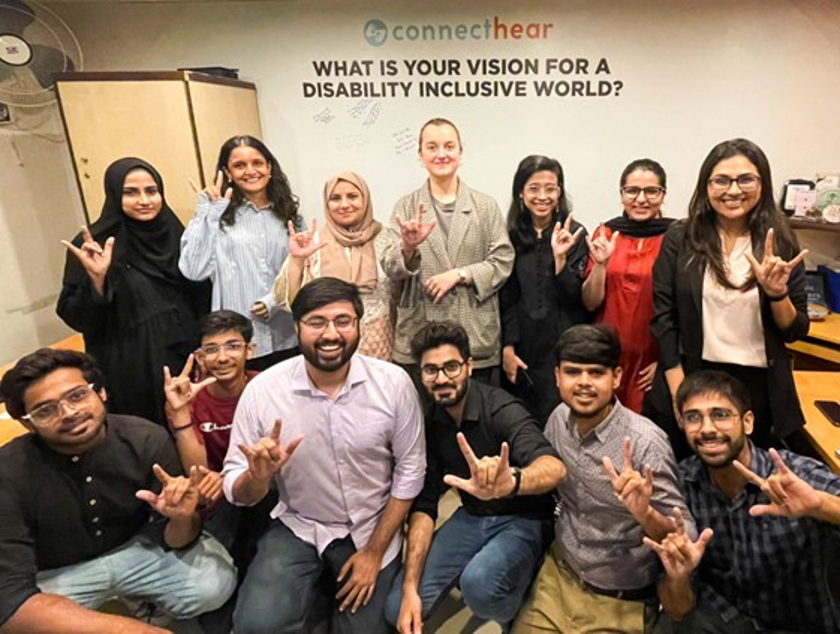
Maryam and Pollyanna with the ConnectHear team signing "Love" in Pakistani Sign Language
Summary
Disability innovation as a sector is accelerating rapidly in Pakistan. As GDI Hub expands the horizons of its disability inclusion and innovation globally, we look forward to more fruitful engagements and working collaboratively with partners in Pakistan to drive inclusion and AT access for people with disabilities worldwide.